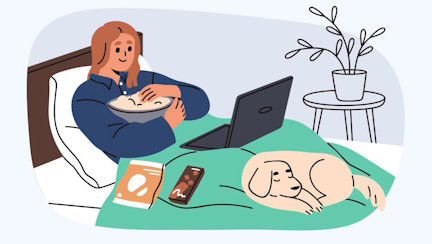Waking up during the night is fairly common, with more than 35% of people waking up during the night at least three times per week. Environmental factors, such as a partner snoring, a change in the room temperature or a loud car driving by, may wake you up momentarily from sleep. Usually, most people fall back asleep easily.
If you’re waking up at the same time each night or waking up frequently throughout the night and struggling with falling back asleep, it could be due to factors beyond your environment. Learn the possible reasons you might wake up during the night and how to determine if your awakenings warrant a doctor’s visit.
Circadian Rhythm and Sleep Cycles
A variety of factors could cause a person to wake up each night when they would prefer to be asleep. These factors might intersect with natural bodily rhythms, such as your circadian rhythm or sleep cycle, to make waking up at a specific time more likely.
The circadian rhythm is an internal 24-hour clock that causes different hormones to release at different times of day to either promote sleep or energize the body and mind.
We also cycle through four sleep stages as we sleep, and wake up more easily at certain points of this cycle than others. Combined with these existing rhythms, other factors that cause people to wake up at night might result in regularly waking up around the same time.
Reasons for Waking Up in the Middle of the Night
A wide range of factors can contribute to frequent nighttime wakings, from physical discomfort and environmental noise to underlying health issues or stress. Understanding the potential reasons behind these nighttime interruptions is the first step toward getting better, more restful sleep.
Insomnia
If you struggle with falling or have trouble staying asleep, you may be experiencing insomnia. Common symptoms of insomnia include:
- Trouble falling asleep
- Waking up during the night
- Waking up too early in the morning and being unable to fall back asleep
- Not sleeping soundly
- Not sleeping enough despite having enough time and the right environment for sleep
- Feeling tired during the day
Insomnia can be caused by a variety of factors:
- Shift work
- Napping during the day
- Using technology in bed
- Inconsistent bedtimes
- Smoking, alcohol, and drugs
- Caffeine late in the day
- Pregnancy
- A bright or noisy room
- Physical pain
- A lack of exercise
If you think you may be struggling with insomnia, there are a variety of treatment options, including cognitive behavioral therapy, lifestyle changes, and sleep medications, as well as treating co-existing medical, mental, and sleep disorders.
Sleep Apnea
Sleep apnea is a common sleep disorder that causes repeated interruptions in breathing during the night. These pauses, which can last from a few seconds to over a minute, are typically caused by a blocked airway (obstructive sleep apnea) or the brain failing to signal the body to breathe (central sleep apnea). Each time breathing stops, your brain briefly wakes you up to resume normal airflow—even if you don’t remember these awakenings the next morning.
Over time, this cycle can happen dozens or even hundreds of times a night, severely disrupting your sleep quality. You may wake up gasping for air, feel short of breath, or experience dry mouth or a headache in the morning. Symptoms often include excessive daytime sleepiness, poor concentration, and irritability.
Because sleep apnea often goes undiagnosed, especially if you don’t have a bed partner to observe symptoms like loud snoring or choking sounds, it’s important to talk to your doctor if you suspect it may be affecting your sleep. Diagnosis typically involves a sleep study, and treatments like CPAP therapy can significantly improve both sleep quality and overall health.
Anxiety, Depression, or Stress
When your mind is racing or your body remains in a heightened state of alert, it becomes difficult to stay asleep, even if you fall asleep easily at first. People with anxiety may wake up in the middle of the night feeling restless or overwhelmed, while depression is often linked to early morning awakenings and disrupted sleep cycles.
And stress can negatively impact almost all of the body, including your sleep quality. A study of medical students found that those who reported higher stress levels also reported poorer quality of sleep.
Addressing these conditions through therapy, relaxation techniques, or medical treatment can help improve both mental well-being and sleep quality.
Indigestion
Digestive discomfort is a common culprit behind nighttime awakenings. Eating large, rich, or spicy meals too close to bedtime can lead to indigestion or acid reflux, which may wake you with a burning sensation in your chest or a sour taste in your mouth. Lying down too soon after eating can exacerbate symptoms, making it harder for your body to properly digest food.
Adjusting your evening eating habits—such as eating earlier or choosing lighter meals—can help reduce the risk of sleep disruptions caused by digestive issues.
Night Terrors
While more common in children, night terrors can also affect adults and may cause sudden awakenings accompanied by intense fear, confusion, and a racing heart. Unlike nightmares, which occur during rapid eye movement (REM) sleep, night terrors usually happen during deep non-REM sleep and may not be remembered the next day. These episodes can be triggered by stress, sleep deprivation, or underlying conditions like sleep apnea.
If night terrors happen frequently or disrupt your overall sleep quality, it’s worth discussing with a sleep specialist.
Pregnancy
Pregnancy introduces a wide range of physical and hormonal changes that can interfere with uninterrupted sleep. Discomfort from a growing belly, frequent trips to the bathroom, heartburn, leg cramps, and anxiety about childbirth can all cause you to wake up during the night. Hormonal fluctuations can also affect sleep patterns and contribute to vivid dreams or restless sleep.
Using supportive pregnancy pillows, staying hydrated earlier in the day, and following a calming bedtime routine may help reduce disruptions and improve rest during pregnancy.
Aging
Your nighttime awakenings might be a normal part of the aging process. Around middle age, adults begin to wake up more often at night and experience shortened sleep duration due to circadian rhythm changes. Older adults are also more likely to take longer to fall asleep at night and wake up too early in the morning, then struggle to fall back asleep.
Both cognitive behavioral therapy for insomnia and strategic light exposure have been found to help. Additionally, it’s helpful to avoid or minimize daytime naps, particularly in late afternoon or evening, as well as exercising regularly (not within three hours prior to bedtime) and maintaining a consistent daytime schedule.
Hormones
Hormonal fluctuations can significantly impact your sleep and may be a hidden reason you keep waking up at night. For people assigned female at birth, changes in estrogen and progesterone—especially during menstruation, pregnancy, or menopause—can lead to hot flashes, night sweats, and disrupted sleep cycles. Similarly, low testosterone levels in men have been linked to poor sleep quality. Thyroid imbalances and other endocrine disorders can also cause restlessness or nighttime awakenings.
If you suspect hormones are playing a role, it may be helpful to track symptoms and speak with your doctor about testing or treatment options. If you’re perimenopausal or menopausal and experiencing body temperature fluctuations, you can also try investing in cool bedding or a fan to help you sleep more comfortably.
Restless Legs Syndrome
Restless legs syndrome (RLS) is a neurological condition that causes an irresistible urge to move your legs, often accompanied by uncomfortable sensations like tingling, crawling, or itching. These symptoms typically worsen at night or when lying down, making it difficult to fall asleep—or stay asleep once you do. People with RLS may wake up frequently during the night without realizing what’s disrupting their rest.
Treatment often includes lifestyle changes, iron supplementation (if low), or prescription medications aimed at calming the nervous system.
Pain
Attaining adequate sleep is especially important when you have chronic pain, but it can be difficult since chronic pain often causes nighttime awakenings that lead to inadequate sleep. Relieving pain and any related mood issues, such as anxiety and depression, can help with related sleep problems.
Medications
Certain medications may negatively impact sleep or cause nighttime awakenings.
- Beta-Blockers: Primarily used to treat hypertension, these medications can impact sleep by suppressing melatonin production in the body. Since melatonin promotes sleep, this suppression can make sleeping soundly difficult. Research suggests that supplementing with melatonin may counteract the effect beta-blockers have on sleep.
- Diuretics: Diuretics help lower blood pressure by reducing the amount of water in your body. However, you may find that you urinate more frequently while taking them. Frequent nighttime wakings to use the restroom can disrupt your sleep cycle and may leave you struggling to fall back asleep.
- Antidepressants: Antidepressants help treat depression as well as various other mental health disorders. However, trouble sleeping is a common side effect of antidepressants.
If you have concerns about your current medications, it is important to discuss them with your doctor.
Bedroom Environment
Your sleep environment plays a bigger role in nighttime awakenings than you might think. Factors like noise, light, temperature, or even an uncomfortable mattress or pillow can disrupt your sleep cycles and cause you to wake up at odd hours. A bedroom that’s too hot, too cold, or poorly ventilated can affect your body’s ability to stay in deep, restorative sleep.
Minimizing distractions, keeping your room cool and dark, and investing in comfortable bedding can go a long way toward improving sleep continuity.
Lifestyle Factors
Certain daily habits can directly impact your ability to sleep through the night. Consuming caffeine or alcohol too close to bedtime, eating large meals late in the evening, or maintaining an inconsistent sleep schedule can all contribute to nighttime awakenings. One study found that people who do not maintain a set bedtime report more sleep-related problems.
Screen time before bed—particularly the blue light from phones, tablets, or TVs—can also interfere with your body’s natural melatonin production, making it harder to stay asleep.
People who smoke are also more likely to report poorer sleep quality than those who do not. Additionally, some people wake up to smoke a cigarette during the night, further impacting their sleep quality.
How to Fall Back Asleep
Waking up in the middle of the night can be frustrating—especially when it feels impossible to drift off again. But a few simple techniques can help you relax and fall back asleep more easily.
- Avoid Checking the Time: Watching the clock can create anxiety about lost sleep, which only makes it harder to fall asleep again. If possible, turn your clock away from view.
- Keep the Lights Low: Bright light can signal to your brain that it’s time to wake up. If you need to get up, use a dim nightlight or keep lighting minimal to avoid disrupting your sleep-wake cycle.
- Try Deep Breathing or Meditation: Gentle breathing exercises, body scans, or guided meditations can help calm your nervous system and quiet racing thoughts.
- Use a Relaxation Technique: Techniques like progressive muscle relaxation, visualizing a calming place, or repeating a soothing word or phrase can ease you back into sleep.
- Don’t Force It: If you can’t fall back asleep after about 15–20 minutes, get out of bed and do a quiet, non-stimulating activity in low light—like reading a physical book—until you feel sleepy again.
The key is to avoid stimulating your brain with screens, bright lights, or stress. With a little patience and the right strategy, you can usually ease yourself back into restful sleep.
How to Stop Waking Up in the Middle of the Night
If you frequently wake up during the night, improving your sleep habits and environment can help you stay asleep longer and enjoy more restorative rest.
- Establish a Consistent Sleep Schedule: Going to bed and waking up at the same time every day—even on weekends—helps regulate your internal clock and reduces nighttime awakenings.
- Create a Calming Bedtime Routine: Wind down with relaxing activities like reading, light stretching, or listening to soothing music to signal to your body that it’s time to sleep.
- Limit Stimulants and Alcohol: Caffeine, nicotine, and alcohol can interfere with your sleep cycle, especially when consumed in the late afternoon or evening.
- Reduce Screen Time Before Bed: The blue light from phones, tablets, and TVs can suppress melatonin, the hormone that regulates sleep. Try turning off screens at least an hour before bed.
- Keep Your Bedroom Comfortable: Aim for a cool, quiet, and dark environment. Consider blackout curtains, earplugs, or a white noise machine if light or noise is a problem.
- Watch What and When You Eat: Avoid heavy meals close to bedtime, and try not to drink too many fluids in the evening to prevent waking up for bathroom trips.
Making small, intentional changes to your nightly routine and sleep environment can go a long way in helping you stay asleep longer and wake up feeling more refreshed.
When to Talk to Your Doctor
Waking up occasionally during the night is normal, but frequent or persistent awakenings that interfere with your sleep quality may be a sign of an underlying issue. It’s a good idea to talk to your doctor if:
- You wake up multiple times a night and have trouble falling back asleep
- You feel excessively tired during the day despite getting enough time in bed
- You experience symptoms like snoring, gasping, or pauses in breathing during sleep
- Your sleep is disrupted by anxiety, depression, or unexplained physical discomfort
- You’re pregnant and having new or worsening sleep difficulties
- You suspect your medication or a health condition is interfering with your rest
A healthcare provider can help identify potential causes—such as sleep apnea, restless legs syndrome, or hormonal imbalances—and recommend the right treatment or next steps. Getting professional guidance is especially important if poor sleep is impacting your daily life or overall health.











